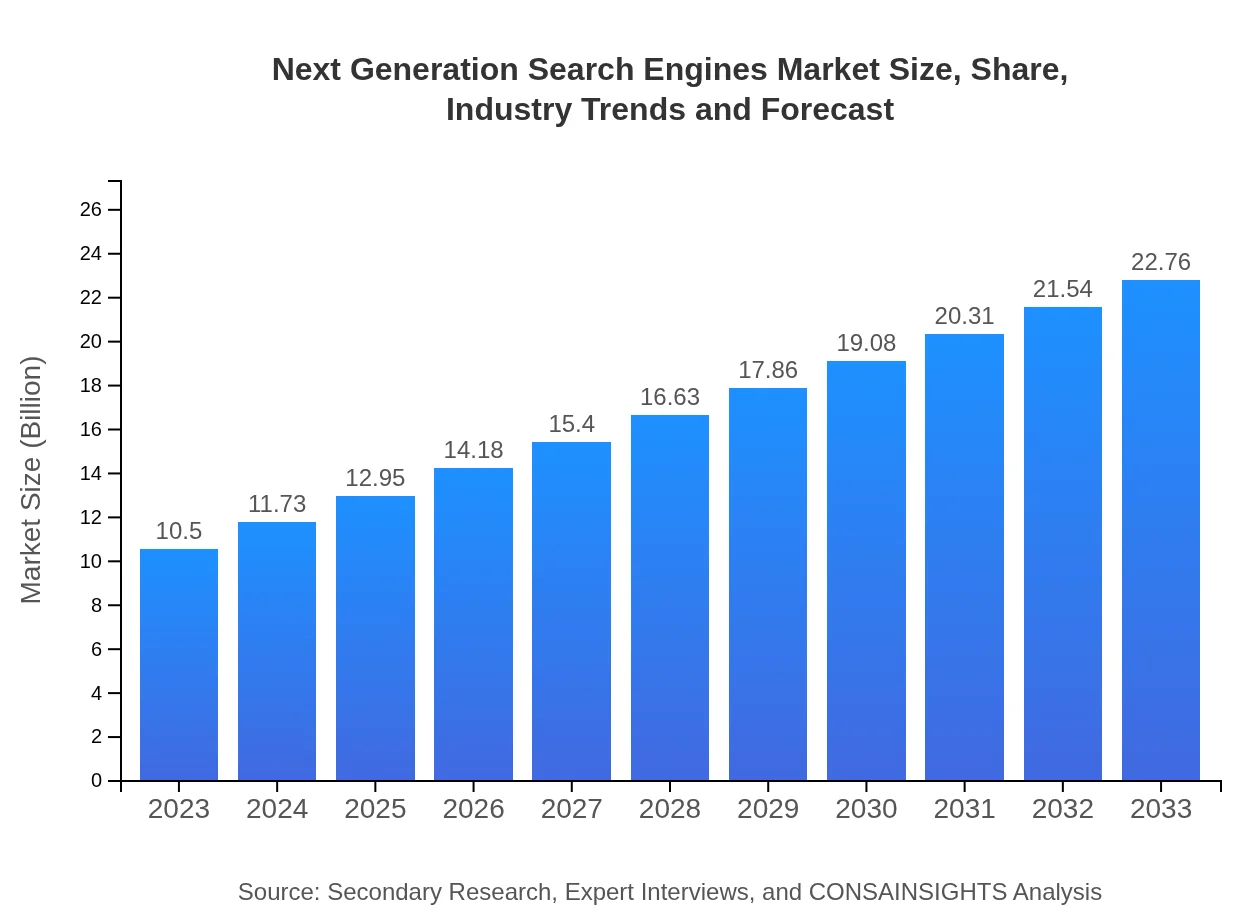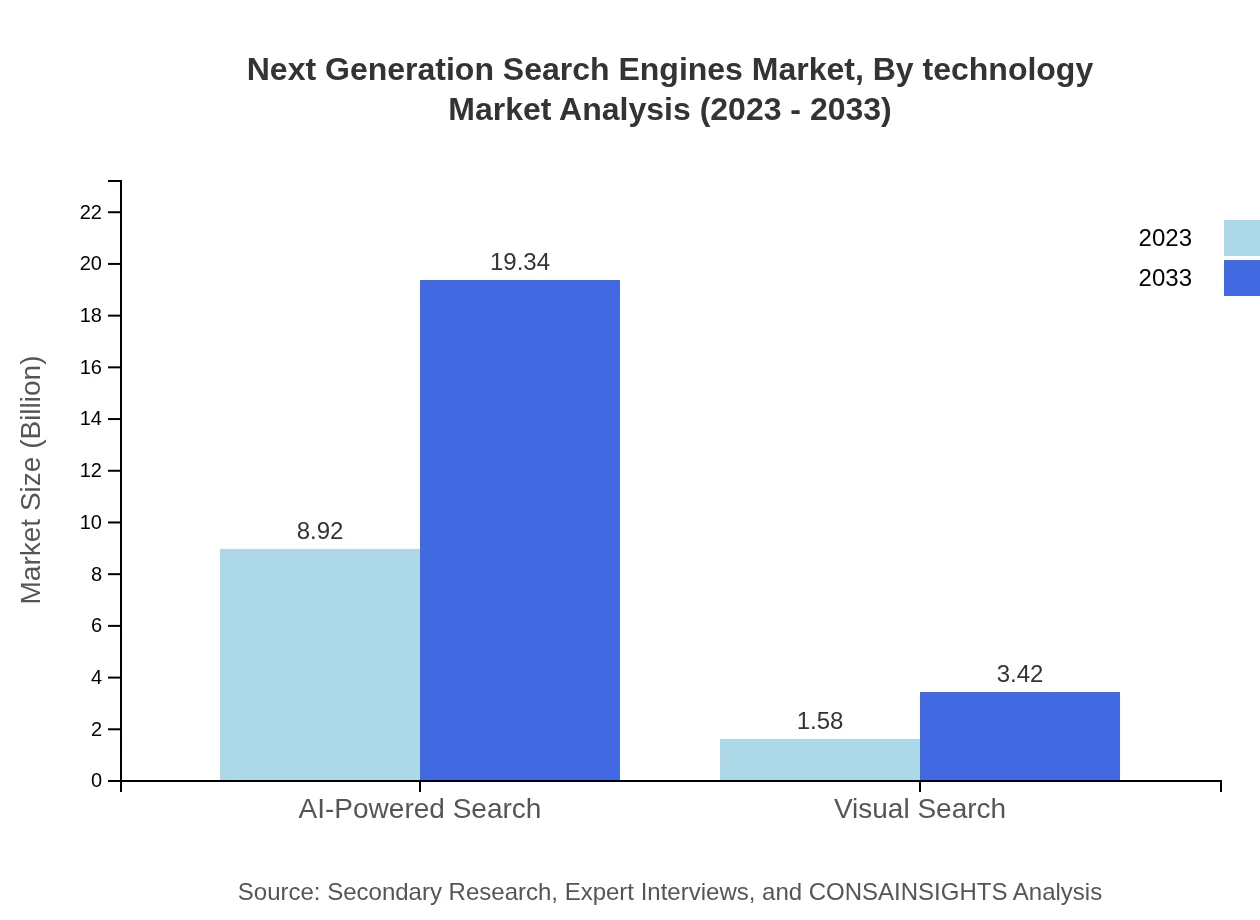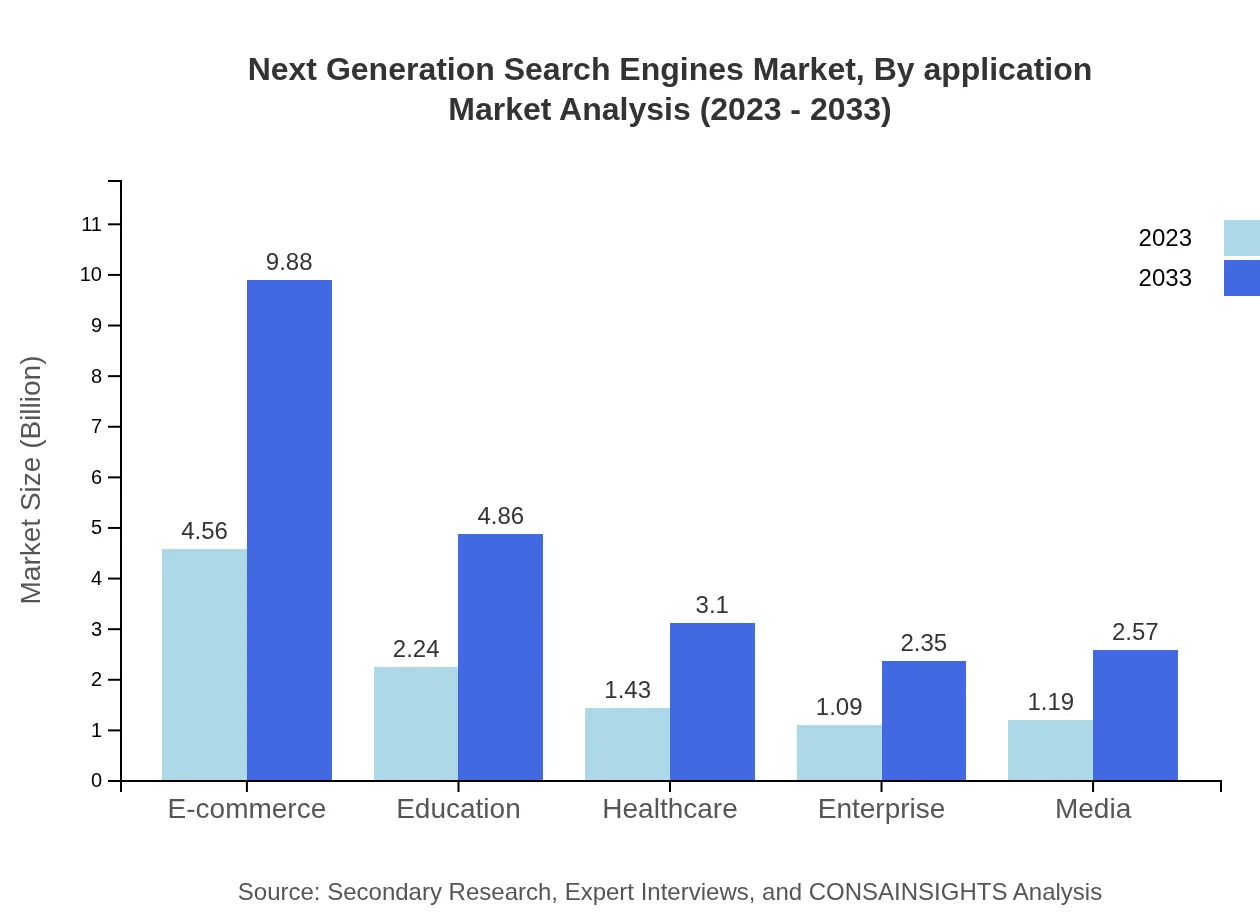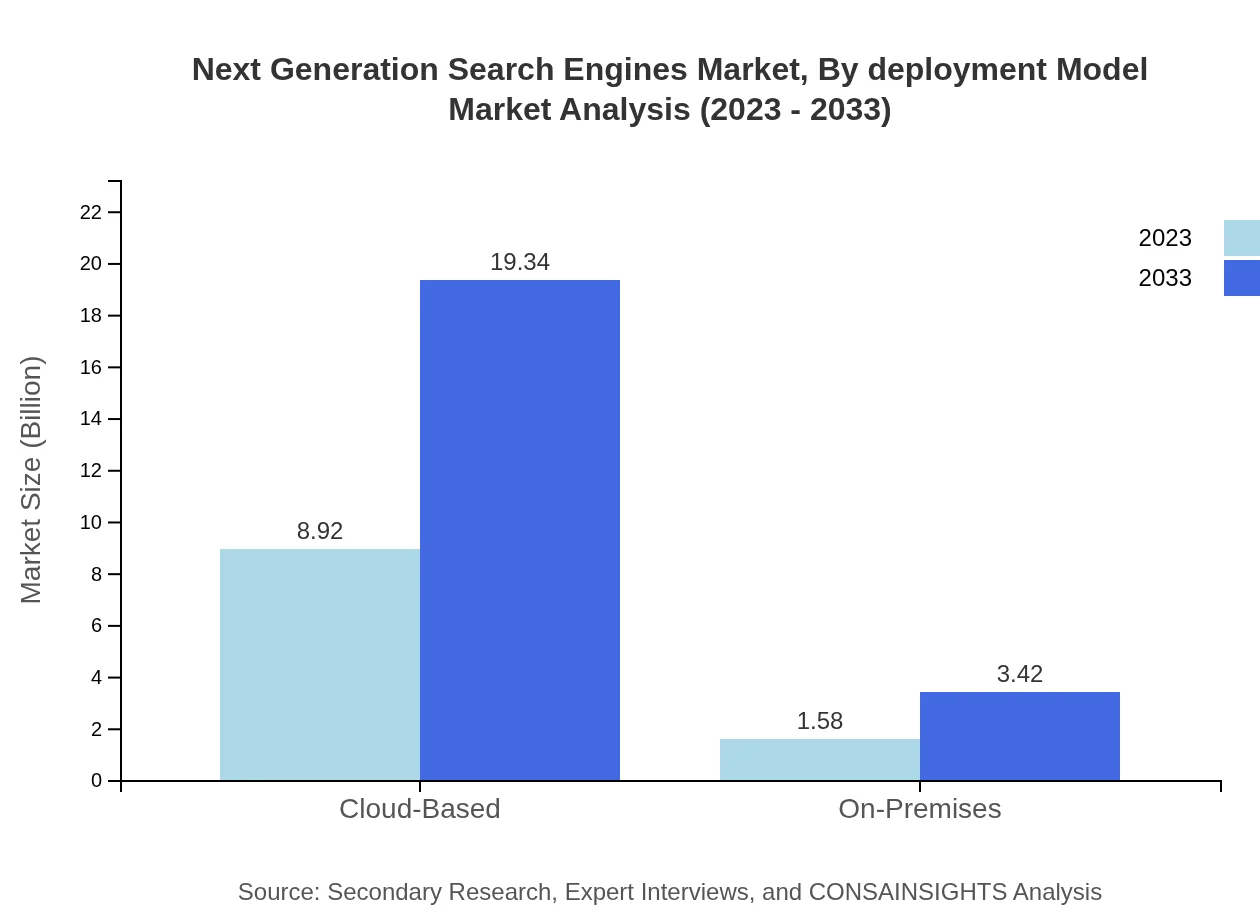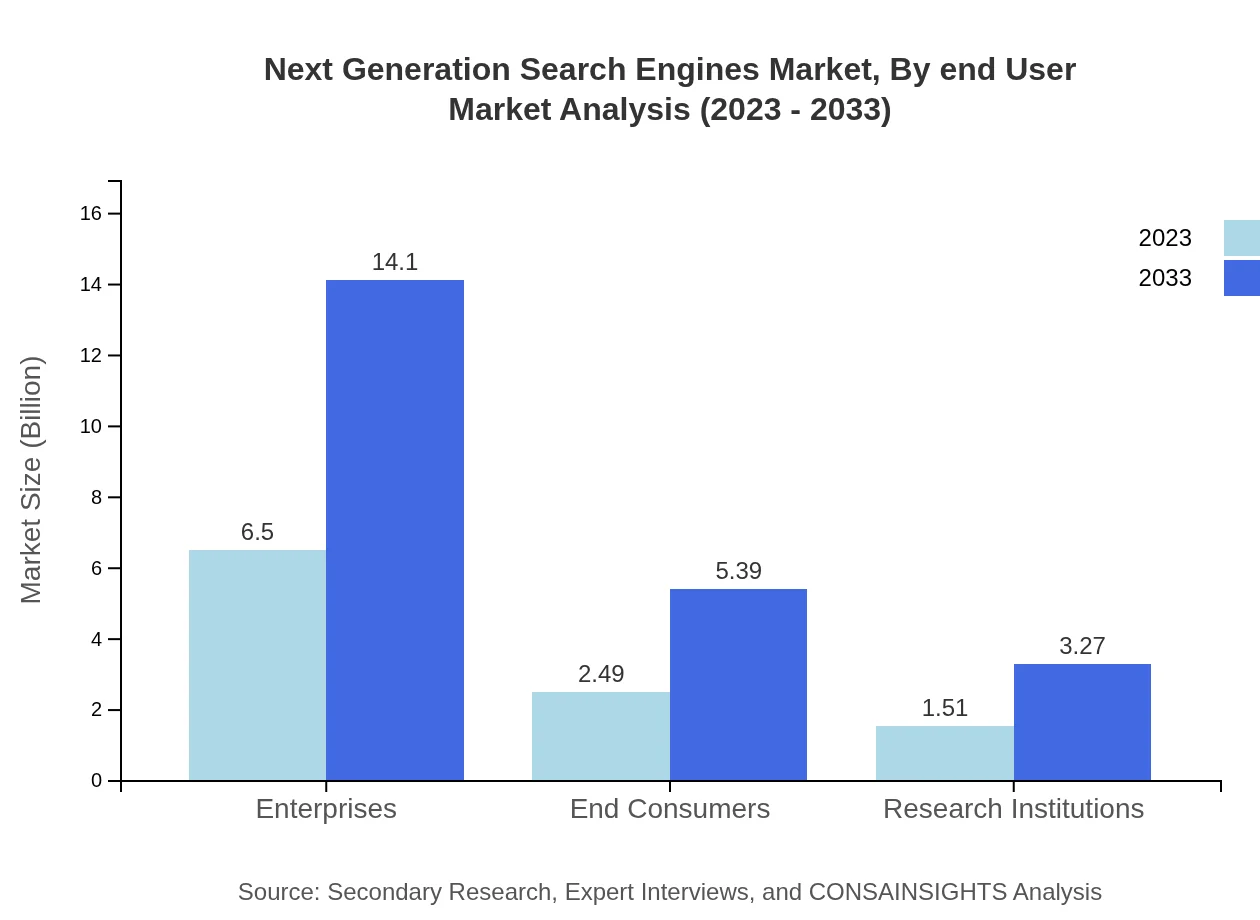Next Generation Search Engines Market Report
Published Date: 31 January 2026 | Report Code: next-generation-search-engines
Next Generation Search Engines Market Size, Share, Industry Trends and Forecast to 2033
This report provides a comprehensive analysis of the Next Generation Search Engines market from 2023 to 2033, delving into industry insights, market size, segmentation, and trends that will shape the sector's future.
| Metric | Value |
|---|---|
| Study Period | 2023 - 2033 |
| 2023 Market Size | $10.50 Billion |
| CAGR (2023-2033) | 7.8% |
| 2033 Market Size | $22.76 Billion |
| Top Companies | Google LLC, Microsoft Corporation, Amazon Web Services, Yandex N.V., Baidu, Inc. |
| Last Modified Date | 31 January 2026 |
Next Generation Search Engines Market Overview
Customize Next Generation Search Engines Market Report market research report
- ✔ Get in-depth analysis of Next Generation Search Engines market size, growth, and forecasts.
- ✔ Understand Next Generation Search Engines's regional dynamics and industry-specific trends.
- ✔ Identify potential applications, end-user demand, and growth segments in Next Generation Search Engines
What is the Market Size & CAGR of Next Generation Search Engines market in 2023?
Next Generation Search Engines Industry Analysis
Next Generation Search Engines Market Segmentation and Scope
Tell us your focus area and get a customized research report.
Next Generation Search Engines Market Analysis Report by Region
Europe Next Generation Search Engines Market Report:
In Europe, the market size is estimated to grow from $3.62 billion in 2023 to $7.85 billion in 2033. Factors such as stringent data protection regulations and increasing demand for enhanced search functionalities contribute to market growth amidst a competitive landscape.Asia Pacific Next Generation Search Engines Market Report:
In the Asia Pacific region, the Next Generation Search Engines market is projected to grow from $1.77 billion in 2023 to $3.84 billion by 2033, fueled by the rapid digitalization and increasing internet penetration in countries like India and China. The region's growing population of tech-savvy consumers further supports market expansion.North America Next Generation Search Engines Market Report:
North America is anticipated to dominate the market, with growth from $3.66 billion in 2023 to $7.93 billion in 2033. The region's mature digital infrastructure, high disposable income, and strong emphasis on technological innovation foster a robust market environment.South America Next Generation Search Engines Market Report:
The South American market is expected to experience a growth surge, moving from $0.50 billion in 2023 to $1.09 billion in 2033. This growth is primarily driven by increasing investments in technology and the adoption of digital platforms by businesses across the region.Middle East & Africa Next Generation Search Engines Market Report:
The Middle Eastern and African market is set to increase from $0.95 billion in 2023 to $2.06 billion by 2033. The expansion of internet services and increasing smartphone penetration are critical elements driving market development in this region.Tell us your focus area and get a customized research report.
Next Generation Search Engines Market Analysis By Technology
AI-powered search is expected to retain a dominant market share due to its advanced analytical capabilities, projected to grow from $8.92 billion in 2023 to $19.34 billion by 2033, highlighting consumer preference for personalized search experiences. Visual search is also emerging with an estimated increase from $1.58 billion to $3.42 billion, with users seeking more dynamic interaction methods.
Next Generation Search Engines Market Analysis By Application
E-commerce leads the application segment with a significant market share of $4.56 billion in 2023 and growth to $9.88 billion by 2033, as businesses enhance customer engagement through tailored search results. Education and healthcare sectors are also investing heavily in search technologies to improve access to information.
Next Generation Search Engines Market Analysis By Deployment Model
Cloud-based deployment models are favored, showing a substantial increase from $8.92 billion in 2023 to $19.34 billion by 2033 as organizations prefer cost-effective solutions. On-premises solutions are also relevant, although growth is slower, as companies balance security and scalability needs.
Next Generation Search Engines Market Analysis By End User
The enterprise segment dominates with a size $6.50 billion in 2023, expected to grow to $14.10 billion by 2033. The end consumer segment is also vital, with market values increasing from $2.49 billion to $5.39 billion, showcasing increasing reliance on personal search technologies.
Next Generation Search Engines Market Trends and Future Forecast
Tell us your focus area and get a customized research report.
Global Market Leaders and Top Companies in Next Generation Search Engines Industry
Google LLC:
A pioneer in search technology, Google continually innovates its search algorithms and expands its services, investing heavily in AI and machine learning to enhance search relevance and user experience.Microsoft Corporation:
Through its Bing search engine and partnerships with other platforms, Microsoft integrates AI to analyze user behavior and improve search functionalities, focusing on enterprise solutions.Amazon Web Services:
Amazon is a leader in cloud computing and has introduced search capabilities within its platforms, aiding businesses in optimizing product visibility through intelligent search functionalities.Yandex N.V.:
Yandex, predominantly active in Russia and surrounding countries, employs advanced algorithms focusing on local search optimization, leveraging machine learning to enhance regional search results.Baidu, Inc.:
Baidu dominates the Chinese search engine market, using proprietary technologies to tailor search results to meet the user needs in one of the largest digital markets globally.We're grateful to work with incredible clients.









FAQs
What is the market size of next Generation Search Engines?
The next-generation search engines market is projected to grow from $10.5 billion in 2023 to significant growth, achieving a CAGR of 7.8% through 2033. This growth reflects the increasing reliance on advanced search capabilities across various sectors.
What are the key market players or companies in this next Generation Search Engines industry?
Key players in the next-generation search engines market include Google, Microsoft, and Baidu, among others. Their innovations in artificial intelligence and user experience are crucial in driving the evolution of search technologies and maintaining competitive advantages.
What are the primary factors driving the growth in the next Generation Search Engines industry?
Factors driving growth include the rising demand for AI integration in search processes, increasing volumes of data across sectors, enhanced user experience expectations, and advancements in machine learning algorithms facilitating more accurate search results.
Which region is the fastest Growing in the next Generation Search Engines?
Europe emerges as the fastest-growing region, with the market size expected to escalate from $3.62 billion in 2023 to $7.85 billion by 2033, reflecting strong investments in technology and digital infrastructure supporting advanced search solutions.
Does ConsaInsights provide customized market report data for the next Generation Search Engines industry?
Yes, ConsaInsights offers customized market report data that caters to specific needs within the next-generation search engines sector. This tailored approach facilitates more precise insights into niche markets and unique consumer demands.
What deliverables can I expect from this next Generation Search Engines market research project?
Expected deliverables include comprehensive market analysis, competitive landscape insights, regional forecasts, segmentations by type and application, and actionable strategic recommendations, empowering stakeholders to make informed decisions.
What are the market trends of next Generation Search Engines?
Current market trends witness an emphasis on AI-powered search technologies, increasing usage of cloud-based services, and the integration of visual and voice search capabilities, shifting how users engage with information retrieval and interaction.

